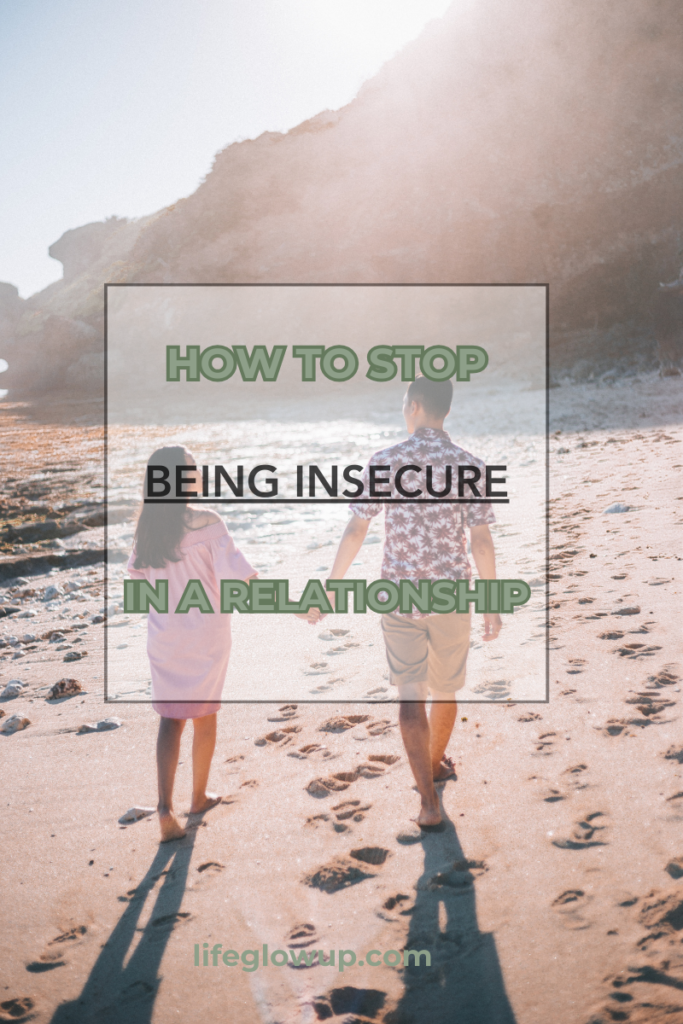This post is about how to stop being insecure in a relationship.
Do you sometimes find yourself feeling a rush of jealousy over seemingly insignificant things? Have you found yourself doubting whether you are good enough in his eyes? You may have asked too many questions about that mysterious co-worker he once mentioned. Or your phone calls have become a constant search for validation for every move he makes.
If you find yourself nodding along in agreement, you’re not alone. These signs often indicate the subtle presence of insecurity in a relationship. Your partner might express love and care, yet you find yourself feeling insecure. Therefore, it’s crucial to explore the reasons behind your insecurity and get to the root causes.
In this post, we’ll cover the meaning behind relationship insecurities, the signs you might be insecure, as well as how to stop being insecure in a relationship.

What is relationship insecurity?
Experiencing insecurity in a relationship indicates a lack of confidence in it. Consequently, questions about your worthiness and fear of your partner leaving may arise. Moreover, doubts about deserving love, questioning self-worth, and concerns about attractiveness might be part of this experience.
These insecurities often have roots in your past; if left unaddressed, they can continue to influence your present and future. Therefore, it’s essential to actively work on strategies to stop being insecure in a relationship.
What are the Signs of Relationship Insecurity?
1. You Are Constantly Jealous
No matter how transparently your partner communicates, you consistently find reasons to feel jealous. As a result, you scrutinize his actions and question his intentions, which often leads to controlling behavior.
2. You Can’t Be Without Him
Rather than sharing a life, he becomes your entire life. Independence feels challenging, and every time he seeks time with friends or desires a day alone, you find yourself questioning the entire relationship. You may wonder: Why doesn’t he want to spend time with me? Are his friends more important than me?
3. You Don’t Trust Him
Trust isn’t just crucial; it forms the foundation of a healthy relationship. A lack of trust can result in a perpetual fear of betrayal, manifesting as baseless accusations of cheating. Distrusting your partner may also involve frequent checking of his phone without permission.
4. Need for Reassurance
When insecurity creeps into your relationship, you might find yourself in a constant quest for validation to feel secure. The need for frequent declarations of “I love you,” seeking compliments, or desiring constant companionship can lead to excessive dependence on him for reassurance.
5. You Have Low Self-Esteem
If you have low self-esteem you might feel like you are not good enough, or aren’t worthy of love. Therefore, it can result in a lack of trust and feeling insecure within the relationship.
Why am I insecure?
Feeling insecure in a relationship can have various causes, be it experiences from childhood, current relationship problems, or a lack of self-confidence.
1. Childhood
Insecurity in relationships often stems from our childhood experiences. If we grew up with parents who were distant or inattentive, this can lead to insecurities when building relationships with others. These early experiences influence how we approach relationships as adults.
There are three common insecure attachment styles:
* Anxious (preoccupied) attachment: This attachment style can lead to people openly expressing their insecurity in intimate relationships and constantly seeking reassurance.
* Avoidant Attachment (Rejecting Attachment): People with this attachment style cope with their insecurity by acting indifferent and distant and avoiding closeness.
* Disorganized (unresolved) attachment: This style can lead to overt insecurity in relationships due to unresolved childhood issues.
2. Past Relationships
If you have had painful experiences in previous relationships, e.g. betrayal, dishonesty, or rejection, it is only natural that you carry these expectations into new relationships.
As a result, this fear can undermine your self-confidence and make it difficult to feel secure in your current relationship.
3. Current Relationship
While insecurities may well have their roots in previous relationships, it is also possible that your partner’s actions are contributing to these insecurities. Consequently, their behavior could lead to feelings of mistrust or cause you to question their feelings towards you.
4. Low Self-Esteem
If you constantly have negative beliefs about yourself and consistently compare yourself to others, this can reinforce feelings of insecurity.
If you lack confidence in your worth, appearance, abilities, or achievements, these insecurities become even more solidified. As a result, you may project these feelings onto your partner and assume that they have the same negative perception of you.
How to Stop Being Insecure in a Relationship
Feeling insecure is a normal part of life, but it’s essential to consider how you handle those insecurities. Do you find yourself becoming controlling or picking fights over minor issues when insecurity sets in?
To overcome insecurity and boost your confidence, take the time to reflect, communicate, and focus on personal growth. Here are some ways to help you stop being insecure in a relationship:
1. Self-Reflect
To effectively overcome your insecurities, it is important to explore their roots. Take a moment to question what triggers these feelings. Think not only about your past relationships and your childhood but also about your personal characteristics.
Ask yourself: Where do these insecurities stem from? Are they related to past relationships or childhood experiences? Am I struggling with personal insecurities about my appearance, my abilities or my achievements? What exactly triggers these insecurities? Or are you genuinely concerned about your current partner’s behavior?
Consider answering these questions by writing down your thoughts in a journal. If you prefer, talking to a friend can also be a helpful outlet. Getting to the root causes will help you stop being insecure in a relationship.
2. Talk to Your Partner
If your partner inadvertently does or says things that trigger your insecurities (assuming you haven’t addressed them yet), I recommend having an open conversation with them. Create a safe space where you can both talk openly about what triggers you.
Talk to him about how certain actions or words make you feel and how they contribute to your insecurities.
This conversation can help him better understand your perspective, and you can work together to find solutions that provide a greater sense of security.
3. Meet Each Other’s Needs
Insecurities can arise when both partners are not aware of the other’s needs. If your partner doesn’t know how you want to receive love, it will be difficult to address the issue.
Talk to your partner about your emotional needs, especially if your insecurities are related to how they treat you. For example, if you feel that he lacks support for you, expressing this concern can pave the way for improvement.
I firmly believe that open communication is paramount to maintaining a healthy relationship. By sharing your feelings, you and your partner can work together to expand your role as supportive and caring partners.
4. Notice What He Does For You
You may search tirelessly for evidence to confirm your fears, negatively interpreting his words or taking them out of context.
This tendency supports your fears and leads you to assume the worst possible consequences. However, in this search for negatives, you may overlook the positive steps he takes to reassure you – his kind words, his compliments, and his attention to aspects of you that you may not even notice.
So, if you feel insecure or feel the urge to attach a negative meaning to his words, take a moment to remind yourself of all the positive things he does to promote your sense of security.
5. Stop Overthinking
When uncertainty creeps in, overthinking tends to make the situation worse. If you imagine scenarios that are unlikely to happen, you are only fueling constant worry about the future.
It’s important to remember that you can’t control the future. Focus on what you can control in the present, including your thoughts.
Instead of dwelling on worst-case scenarios, focus your thoughts on the best possible outcomes.
Schedule a specific time, such as 20 minutes a day, for your worries. This way, you can prevent yourself from worrying throughout the day and avoid wasting your time. If you find yourself thinking too much outside of this time, reassure yourself that you will deal with these worries in the allocated time.
6. Challenge Negative Self-Talk
Remember that you have the power to choose your thoughts and control how you talk to yourself. Instead of engaging in negative self-talk that can lead to beliefs, flip the script.
When you catch yourself making negative statements about yourself, focus on finding evidence to the contrary. Challenge these negative beliefs by asking yourself if there is anything that supports them.
7. Build Confidence and Love Yourself
To truly love another person, you must first love yourself. Develop self-confidence and self-love by spending time alone, getting to know yourself, and doing activities you enjoy.
Prioritize your body and well-being by doing sports you enjoy and eating healthy. Think about your life goals and take steps to achieve them. Above all, celebrate every success, no matter how small.
This not only strengthens your self-love but also your self-confidence and allows you to feel joy outside of your relationship.
Remind yourself that you are good enough and worthy as you are. Someone who genuinely loves and cares for you will never make you feel anything but more than enough.
8. Be Kind To Yourself
Improving yourself is a difficult but doable journey. Change doesn’t happen overnight, and if you’re reading this blog post, you’re already on the road to self-improvement. You’ve made it!
But as I said, it won’t be a walk in the park. There will be moments when you fall back into old habits, feel jealous, or engage in negative self-talk.
Remember that these setbacks are part of the process. Don’t be too hard on yourself in these moments, it’s completely normal. Just stay on track, and work on these challenges, and you will gradually become a more confident version of yourself, which will promote an overall healthier relationship.
Bottom Line
Insecurity in a relationship often goes hand in hand with the fear of losing your partner or not feeling worthy of love. These insecurities can have their roots in past experiences, childhood, or personal doubts about your appearance and abilities.
It’s normal to feel insecure from time to time; everyone does. However, how you deal with these insecurities is crucial. Do you tend to control your partner or argue over small things?
Or do you communicate openly with your partner about your insecurities and look for solutions together?
With a combination of self-love, effective communication, and patience, you can develop more self-confidence and promote a healthier relationship overall.
I trust that this guide on how to stop being insecure in a relationship provided you with insights into recognizing the signs and understanding the root causes, ultimately aiding you in finding ways to address and overcome them.


